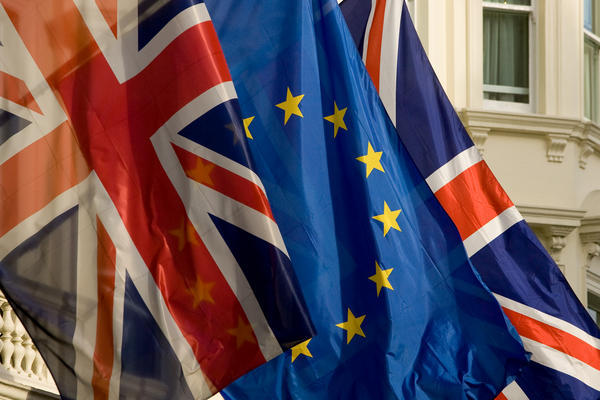First there was talk of a possible “Grexit,” the forced departure of a bankrupt Greece from the EU. Now, with British prime minister David Cameron’s Wednesday announcement that he will put the question of the UK’s continued membership to vote should his Conservative Party win the 2015 election, there’s speculation about what might be called a “Brexit.”
That drastic outcome seems unlikely, not least because much can change between now and 2015. But there’s no denying that Cameron has cast a stone into the pond. Even before Cameron delivered his much-anticipated speech, a senior State Department official stated during a visit to the UK that, insofar as the United States was concerned, it was best that Britain remain in the EU. Those remarks received considerable press coverage—for a day or so, anyway—but they won’t have any effect on what the British decide to do: they will, and should, act based on what’s best for them. (Note to Washington: If you really want the Brits to stay in the EU, you might not want to lecture them in public.)
While Cameron’s proposed referendum has stirred controversy, it’s worth remembering that this isn’t the first time that British voters have been asked to opine on whether or not they wished to remain in the EU. The same question was put to them in 1975, and a tad more than two-thirds of those who voted said yes. And it was a Labour prime minister, Harold Wilson, who decided to solicit their views.
Nor is Britain’s ambivalence about the EU recent. The entire idea of European integration was born on the continent. Its foremost proponents were two Frenchmen, Jean Monnet and Robert Schuman, to whom the project was a path to recovery and prosperity for war-ravaged Europe, as well as a way to end its seemingly endless wars. There was no British equivalent to either of these idealists. When Britons thought of special relationships, it was America, not Europe, that they had in mind. Opposition to the EU in Britain now tends to be seen as something peculiar to its conservatives, but, in the run-up to Britain’s formal membership, there were prominent Labour Party leaders who weren’t keen on the idea, Tony Benn and Hugh Gaitskell among them.
The antipathy was not a one-way affair. French President Charles De Gaulle opposed Britain’s membership in the EU, convinced that that the Brits would act as a stalking horse for the United States, whose influence in European affairs he wanted to check. In his eyes, a united Europe, guided by a Franco-German partnership (with France as the senior member of the duo of course), would serve as a separate center of power to counteract Pax Americana. And in that scheme there was no place for Perfidious Albion. So when the British applied for membership in what was then the European Economic Community (EEC), De Gaulle cast a veto in 1963—and again in 1967.
With De Gaulle gone, courtesy of the 1968 upheavals in France, Britain renewed its bid for membership in Club Europe. In 1973, it joined the EEC (which would later morph into the EU)—under a Conservative prime minister, Edward Heath. Membership made sense, especially since a sizable proportion of British trade was by then conducted with the EEC economies. Moreover, the project of European integration had confounded skeptics and was advancing apace; and so it seemed that Britain, its global influence having declined from the glory years of the 19th century, would count for more in world politics as part of a cohesive Europe. Perhaps America would be more attentive, too, and not take the special relationship for granted, a perennial British concern.
But the British have, in the main, always had a different conception of the ultimate ends of European integration than have its most fervent proponents on the continent. Britons recognized and wanted to gain the benefits of a pan-European, tariff-free market. But as for centralized EU institutions that reduce the sovereign powers of states—the Common Agricultural Policy (a subsidy for farmers, and the single biggest item in the EU budget), a common currency, convergent social policies, and the idea of something approaching a United States of Europe—many Britons were less keen. Some said, in effect, “Not for us, thank you very much.” As Cameron observed in his speech, the British attitude toward European integration has always been “more practical than emotional.”
Emblematic of this sentiment was Britain’s choice to stick with the pound and forgo the euro as well as its insistence on an “opt out clause” on the economic provisions of the 1992 Maastricht Treaty. Ditto the periodic efforts, which reached a climax under prime minister Margaret Thatcher but have been in evidence under Cameron as well, to reduce Britain’s contributions to the EU budget (and the size of the budget itself) and prune the powers of the Brussels bureaucracy.
So what’s Cameron up to? Is he throwing a bone to anti-EU Tories to shore up party unity? Is he strengthening his bargaining position within the EU so that Britain remains a member, but on terms more to his liking? Is he merely reflecting the long-running divisions within the British political class on the EU? The answer: all of the above. Whatever Cameron’s motives, European leaders are, as the British like to quip, not amused. His continental counterparts are busy trying to extricate the EU from an economic disaster that has put its very future in question. With all that they’ve got going on—and going badly—they need Cameron’s declaration about as much, as Americans are wont to say, a hole in the head.
Rajan Menon is the Anne and Bernard Spitzer Professor of Political Science at the City College of New York/City University of New York, nonresident senior fellow at the Atlantic Council and the author, most recently, of The End of Alliances. This piece first appeared on The National Interest.
Image: eu-uk.jpg
